
Courtesy Pixabay, Hans Benn, Photographer
Either way, it strikes me odd that we take our supposed linear direction on time from circular mechanisms that are unable to change of their own volition, except for once a year where we make morning seem earlier, even though it really isn’t, then in the fall we realize what an odd choice we made and go back on our decision.
Winter then sees us forget about our lapse. The cloud of amnesia, gained through time influencing time, shrouds our minds, so that come spring we’re intellectual infants, fresh as the crisp crocus air.
Now, I am actually not opposed to daylight savings. In fact, I’m very for it, though I differ in how it is implemented. I actually enjoy that, twice a year, our inner apes get to upset the rigid clockwork of clockwork, and use arbitrary tradition to tell our shared system of accountability that it does not have all the sway, and that it is ultimately, itself, an arbitrary tradition. I like that we get to be human in a world that is increasingly machine.
My umbrage with daylight savings, then, is that it isn’t wild enough. A strict date to spring and fall? That doesn’t seem right. It’s too orderly. My vote is that in every town, we pick one critter who wakes then dens, or arrives then leaves, and base our system of time off of something that is actually real, tangible, and unconditional. Maybe for the towns here in Utah, it can be a ground squirrel. Or a swan. Or RV tourists. Instead of having a strict immobile date, we give all time its greatest accountability: the natural ebbs of the world. We give time the context it is itself within.
This system I’d find actually meaningful, and just great fun. Imagine a likeness to groundhog day, twice a year, in every town, with all sorts of menagerie. The message we’ll send is that time doesn’t control us, nor we time. Instead time is controlled by those who are unaware of their own influence. Each living thing would have a potential chance to alter how we conduct ourselves. In this way, daylight savings no longer becomes anachronistic, or even ironic. Instead, daylight savings can become a dialogue with the world; a conversation with our participation in life. Time becomes grounded in reality. I imagine this conversation:
- “What time is it?”
- “Depends, has the first snow goose arrived?”
- “No, but the last leaves fell off the box elder by the post office.”
- “Then that explains why Bill isn’t here and we are.”
So this daylight savings, if you or someone you know is grumbling that all of this could be so much easier, just say yes, it could, and pitch them this idea if you’re keen on it, too. Let them see that we don’t have to be where we are, with an inane change of the time based on time, but instead we could change the time based on the world which is alive and vibrant around us each day. We could force ourselves to participate in time, by seeing that who we are depends on where we are and the life which encircles the lives we live. Maybe then, we can lose the ironic anachronism we currently have, and let our circadian rhythms be aligned to those natural forces which run deeper than a calendar date wherever, or whenever, you are.
I’m Patrick Kelly and I’m Wild About Utah.
Credits:
Images: Courtesy Pixabay, Hans Benn, Photographer https://pixabay.com/photos/goose-white-snow-goose-flies-4190673/
Audio: Courtesy & © Kevin Colver https://wildstore.wildsanctuary.com/collections/special-collections
Text: Patrick Kelly, Director of Education, Stokes Nature Center, https://www.logannature.org
Included Links: Patrick Kelly & Lyle Bingham, Webmaster, WildAboutUtah.org
Additional Reading
Wild About Utah, Posts by Patrick Kelly
Stokes Nature Center in Logan Canyon, https://www.logannature.org/
